The tech stars took a slight tumble – and some are highly overvalued – but investors’ love of technology is here to stay, says DAVID BUIK
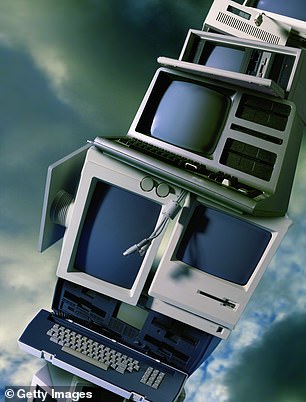
Technology has come a long way and returns have stacked up for investors in recent years, but the story of tech is littered with losses too
It seems as if investors’ love of technology has been with us almost since Noah left the Ark. Of course, this is not quite the case.
I remember my first employer, Philip, Hill, Higginson, Erlangers buying a De La Rue ‘Bull’ computer in 1962 that took up an entire room.
All it seemed to do was spew out endless reams of paper that would have sorted out any unemployment issues in forestry.
I suspect the world at large really started to pay attention to technology, when challenged by five issues.
Firstly, there was the invention of the world wide web, to be known as the internet, by Sir Tim Berners-Lee in 1983.
Secondly, at about that time Shiva Ayyadurai’s place in history was guaranteed as the inventor of the email system, though some still believe that Ray Tomlinson was the originator back in 1971.
Then, thirdly, the first mobile phone was invented by Motorola back in 1973. Even when Nokia, Ericsson and others developed their popularity, they were heinously expensive. I remember having one installed in my car in 1986. It was a proverbial brick, costing £1,000!
Then there was the most influential contributor in Microsoft, the software titan formed by Bill Gates and others in 1975.
Finally, the Blackberry, patented by Research in Motion in 1984 triggered the eventual expansion of the smartphone as we know it today, with Apple very much in the vanguard and Samsung and Google providing aggressive competition.
This also fuelled the value of mobile phone operators around the world.
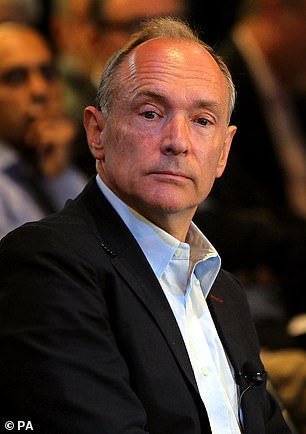

Tim Berners-Lee, the inventor of the world wide web
In the run-up to the turn of the 20th century, tech stocks of all shapes and sizes built around laptops, chips, software, security, defense and mobile operators started to make gargantuan gains.
It was the vogue sector. Companies came to the NASDAQ in the US on a wing and a prayer, with valuations bearing little resemblance to reality.
These tech stocks headed off into the stratosphere, between 1997 and 2000. Valuations could not be sustained and by the end of September 2002, the NASDAQ had surrendered 75 per cent of its value since the turn of the century.
Companies in the US including Worldcom, NorthPoint Communications and Global Crossing bit the dust, losing shareholders billions of dollars.
Remember Bernie Ebbers the founder of Worldcom, found guilty of fraudulent behaviour? He was sentenced to 25 years in 2005 and died in the penitentiary after 13 years in 2018.
Denis Kozlowski of Tyco was imprisoned for nine years until 2014 for taking an unauthorised bonus of $81 million.
The likes of Apple, Amazon, and Cisco racked up huge losses at the turn of the century. How spectacularly they have recovered their poise in the past 20 years beggar belief.
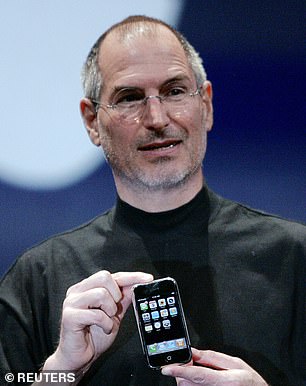

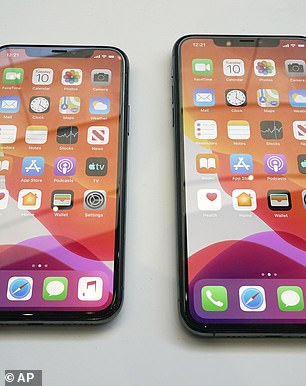

When Steve Jobs presented the iPhone to the world (left) people did not quite comprehend how transformative smartphones would be, or how powerful as with the iPhone 11 (right)
We have recently seen quite a marked sell-off of the NASDAQ during September 2020. From its 2 September peak to the wobble’s low three weeks later, this tech index shed almost 12 per cent before regaining some ground.
However, for as long as ‘semi-lockdown’ continues to leave its global footprint, demand for technology may well gather even more momentum.
Many investors believe that there is unlikely to be a similar sell-off to that that took place in 2000/02, but that is not to say there will not be corrections.
Regulatory controls and corporate governance have significantly improved in recent years, which should help to prevent market disarray.
The fact that Amazon, Alphabet, Facebook, Microsoft, and Apple all lost a chunk of value last month will not have escaped investors’ notice.
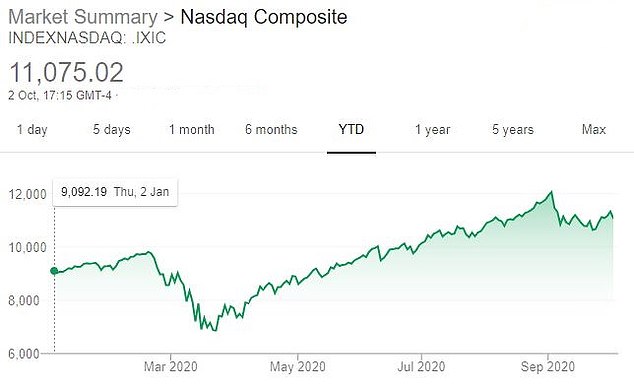

The Nasdaq has posted string gains this year, rebounding from the coronavirus crash – but it had a September wobble
Investors continue to pay a disproportionate premium for tech stocks, which led to an all-time record for the NASDAQ being achieved at the beginning of September.
While technology continues to play an increasingly important role in everyday life, which has been highlighted through the pandemic lockdown, ludicrous P/E ratios of up to 75x earnings in places, which look too rich for many peoples’ blood, may continue to be tolerated.
Just look at the performance of Snowflake’s phenomenal IPO, which saw its shares more than double in value on its first day of trading, bringing the company’s valuation to $65billion. The appetite for the right stocks is still there.
Here in the UK, the arrival, demise or acquisition of the likes of Durlacher, Freeserve, Bookham Technology, Psion, Baltimore, Thus, Logica, Kingston Communications, Kewell Systems, Invensys snd Autonomy at the turn of the last century really only goes to show how relatively unsuccessful the UK was in this field at the time.


Just 15 years, the Blackberry was considered indispensable cutting edge technology
Even the mighty ARM was eventually bought out.
Set out below are a few of the British TMT (telecom, media and technology) companies, plus Deutsche Telekom & France Telecom that fell from grace in terms of valuation; the only exception being Sky, that went on the greater things, eventually being bought by Comcast for $55billion last year.
BSKYB fell from 1,700p to 505p between 2000 and 2002, but eventually reached 1,728p.
Of course, Autonomy was controversially sold to Hewlett-Packard for $11billion in 2011. Invensys was sold to Schneider Electric for £3.4billion.
The brilliant ARM Holding was sold to Softbank for £24billion and may become part of Nvidia’s portfolio for $30billion. It is hoped employment will be maintained for the 3,000 in Cambridge.
But, surprisingly in the wake of this, London is the leading European centre for tech finance. Technology will continue to dominate business and leisure – that’s a fact of life.

